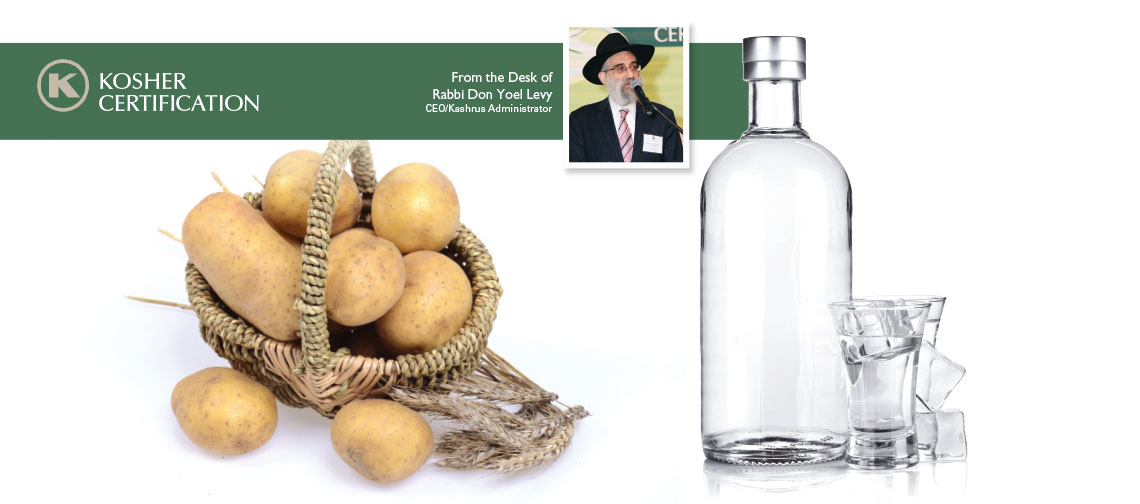L’chaim, anyone? Kosher consumers have long enjoyed a l’chaim after shul, to commemorate a yarzheit, to celebrate simchos, or just to relax at home. Whether it’s a glass of wine, a bit of schnapps, or a lowball glass of whiskey or vodka, there have always been an array of options available.
Recently, there has been much talk concerning whiskey production and the implications for kosher consumers. Most of the controversy has centered on scotch, both straight and blended. Originally, it was assumed that wine or glycerin was used to blend the whiskeys; both of which could present kashrus issues. Today, we know that the main issue with whiskey is the wine casks used in the aging process.
But, what about vodka? Does vodka have similar issues to whiskey? Are there other potential issues that affect the kosher consumer? First, let’s review the vodka production process in brief. The origin of vodka is assumed to be either in Russia or in Poland (for many years Poland was actually part of Russia) and I have visited vodka production facilities in both countries. Historically speaking, it is reported that vodka was made from potatoes. In other places, vodka was made from wheat. There are other sources, as well, which we will discuss later on in this article.
In order to produce any type of alcohol, one needs a carbohydrate, in a sugar form, and yeast. Wine, for example, is produced when the natural yeast on the grapes and the sugar content in the grapes reacts and causes fermentation. The percentage of alcohol in the particular wine will depend on the sugar content in the grapes.
For vodka, one takes the source carbohydrate (potatoes or wheat), grinds them up, adds water and heats the mixture. This will convert the starch to sugar. Then, yeast is added to the mixture. The yeast used in vodka production is manufactured yeast, as opposed to the natural yeast found on grapes. Of course, we have to verify that the yeast is kosher certified. During the fermentation process the mixture often foams, so anti-foam agents might be used to quell the foam. These anti-foams must be kosher, as well.
The fermentation will produce up to 12-14% alcohol. In order to produce whiskey, which contains 40-45% alcohol, the alcohol is distilled to remove the water until it reaches the desired alcohol content.
Vodka, however, is distilled until it reaches almost pure alcohol. This takes usually at least three distillations. Hence the terminology “triple distilled” found on vodka bottles. The vodka is now “cut”, or diluted, with pure distilled water to bring it down to the desired alcohol content.
The distillation process removes most of the impurities in the vodka, so a side benefit of drinking vodka is the possibility of less of a “hangover” after drinking, as opposed to wine or whiskey. Vodka is sold as pure and colorless. If it were aged in barrels, it would turn brown, so the issue of wine casks for aging (like whiskey) does not occur with vodka production. Very few types of vodka are aged, but it’s atypical and would be obvious due to the brown coloring.
In some countries, sugar or glycerin is added to the vodka in order to improve the smoothness of the vodka, but in Poland this is illegal and all vodka is required to be totally pure. In Poland, potatoes are used to make the vodka. I had hoped that there would be a possibility of producing kosher for Passover vodka, but the equipment used in the production is also used for wheat-based alcohol, so at present this is not possible. In Russia, I have seen that they actually add other ingredients to the vodka, so Russian vodka should not be treated as pure vodka.
Another big issue with vodka is that not all vodka is made from potatoes or wheat. There are many companies producing vodka from wine alcohol or whey (which is dairy and usually not Cholov Yisroel).
I have done some research and so far have found at least 18 companies in the United States producing vodka from grape alcohol.
(By the way, some American whiskey is also produced from grape alcohol.) Over the years I have also found vodka produced from whey in the United States. In France, I found three companies producing vodka from grape alcohol, as well as four companies in Australia, and one each in Denmark, Poland, Belarus and Canada. In New Zealand, I found three companies producing vodka from whey. Usually, the bottles will state the source carbohydrate used to produce the vodka.
As we can see, to make a blanket statement that all vodkas are inherently kosher is not correct. The source of the alcohol must be kosher and we must ensure that no other ingredients are being used in the vodka.







